
SustainabilityEnvironmental, Social, and Governance
Telenor Maritime is a dedicated specialist maritime mobile operator and digitalisation enabler. Today, connectivity plays an important integrated role in our daily lives. Our mission is to make that same accessibility possible for both people and IoT devices across all the oceans of the world.
Telenor Maritime follows the Telenor Group policies for responsible businesss performance. To learn more about how Telenor endeavours to be a responsible business see the following link Responsible Business -
Telenor Group.
Telenor Maritime has in addition, established an integrated management system, the Telenor Maritime Management System (TMMS). The TMMS includes all elements of our business and defines how we will work to meet requirements and expectations from the authorities, Telenor, customers and our own management.
The TMMS covers a wide scope based on ISO 9001, ISO 45001, ISO 27001 and Telenor Governance.
It is mandatory for everyone who works for Telenor Maritime to familiarise themselves with relevant documents and comply with company routines and processes. The TMMS is a live management system that is regularly updated and improved.
UN’s Sustainable Development Goals and UN Global Compact
Telenor Maritime is committed to the UN’s Sustainable Development Goals (SDG), and we fully support the UN Global Compact Principles. For our contribution we focus on the goals where either our products have
an impact or where our employees and company have an impact. We are a member of the UN Global Compact.
How our products contribute to UN’s SDGs
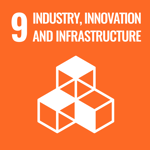 Our products have an impact on Sustainable Development Goal 9: Build resilient infrastructure, promote inclusive and sustainable industrialization and foster innovation, and Goal 13: Take urgent action to combat climate change and its impacts.
Our products have an impact on Sustainable Development Goal 9: Build resilient infrastructure, promote inclusive and sustainable industrialization and foster innovation, and Goal 13: Take urgent action to combat climate change and its impacts.
With our communication technology we are contributing to increasing access to communication and information technology where such technology was not previously available. Our communication
technology is removing the “digital divide” between onshore and offshore. This has a direct impact on Goal 9.c: Significantly increase access to information and communications technology and strive to provide universal and affordable access to internet in least developed countries by 2020.
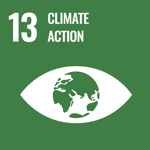 Telenor Maritime’s information and communication technology is enabling others to transition towards green activities. In addition, through our products, customers are able to remain connected and receive early warnings should any crisis or catastrophe occur offshore. Our products have an impact on Goal 13.3: Improve education, awareness-raising and human and institutional capacity on climate change mitigation, adaptation, impact reduction and early warning.
Telenor Maritime’s information and communication technology is enabling others to transition towards green activities. In addition, through our products, customers are able to remain connected and receive early warnings should any crisis or catastrophe occur offshore. Our products have an impact on Goal 13.3: Improve education, awareness-raising and human and institutional capacity on climate change mitigation, adaptation, impact reduction and early warning.
How we contribute to UN’s SDGs
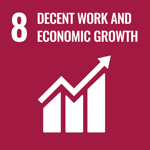 The Telenor Maritime company and its employees contribute to UN Sustainable Development Goal 8: Promote sustained, inclusive and sustainable economic growth, full and productive employment and decent work for all, and Goal 10: Reduce inequality within and among countries. As a business unit of Telenor Group, we value Goal 10 highly and work consistently to reduce inequality. This goal is also a part of our global business strategy.
The Telenor Maritime company and its employees contribute to UN Sustainable Development Goal 8: Promote sustained, inclusive and sustainable economic growth, full and productive employment and decent work for all, and Goal 10: Reduce inequality within and among countries. As a business unit of Telenor Group, we value Goal 10 highly and work consistently to reduce inequality. This goal is also a part of our global business strategy.
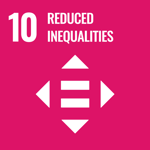 We thrive to promote an inclusive and sustainable economic growth with a focus on innovation and technology, thereby contributing to Goal 8.2: Achieve higher levels of economic productivity through diversification, technological upgrading and innovation, including through a focus on high-value added and labour-intensive sectors. However, the most important goal for Telenor Maritime is an inclusive and safe work environment for all employees and we greatly value Goal 8.8: Protect labour rights and promote safe and secure working environments for all workers, including migrant workers, in particular women migrants, and those in precarious employment.
We thrive to promote an inclusive and sustainable economic growth with a focus on innovation and technology, thereby contributing to Goal 8.2: Achieve higher levels of economic productivity through diversification, technological upgrading and innovation, including through a focus on high-value added and labour-intensive sectors. However, the most important goal for Telenor Maritime is an inclusive and safe work environment for all employees and we greatly value Goal 8.8: Protect labour rights and promote safe and secure working environments for all workers, including migrant workers, in particular women migrants, and those in precarious employment.
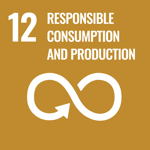 We value climate and environment and our local initiatives aim to promote sustainability and reduce waste generation, which has a direct impact on Goal 12: Ensure sustainable consumption and production patterns and Goal 12.5: By 2030, substantially reduce waste generation through prevention, reduction, recycling and reuse.
We value climate and environment and our local initiatives aim to promote sustainability and reduce waste generation, which has a direct impact on Goal 12: Ensure sustainable consumption and production patterns and Goal 12.5: By 2030, substantially reduce waste generation through prevention, reduction, recycling and reuse.